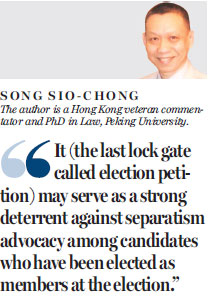Three 'lock gates' to keep separatists out of LegCo
Updated: 2016-09-06 07:55
By Song Sio - Chong(HK Edition)
|
|||||||
Contrary to some misunderstanding of Hong Kong laws, the existing laws and the new laws developed from them are, generally speaking, in good shape and effective, and comply with the Basic Law. Take separatism as an example, there have been three "lock gates" to prevent separatists from becoming lawmakers under Cap 542 of the Legislative Council Ordinance.
The first concerns nomination. In Section 40(1)(b)(i) of Cap 542, the nomination form for the people nominated as candidates should include or be accompanied by "a declaration to the effect that the person will uphold the Basic Law and pledge allegiance to the HKSAR". A confirmation document also has been introduced to ensure the implementation of this provision. If the candidate fails to uphold the pledge, they will be considered to be committing a criminal offense of "false declaration" by virtue of Section 103 of Electoral Affairs Commission (Electoral Procedure) (Legislative Council) Regulation (Cap 541D). The offense includes, but is not limited to:
First, a person "makes a statement which that person knows to be false in a material particular or recklessly makes a statement which is incorrect in a material particular or knowingly omits a material particular from an election related document". In this scenario, omission of the said declaration or confirmation may likely be counted as making a false statement.

Second, a person "directly or indirectly by himself or by another person on his or her behalf conspires with, incites, compels, induces, coerces, intimidates or persuades another person to make a false statement in an election-related document or to provide information which that person knows to be wrong in a material particular in an election related document". In this scenario, conspiring to make a false statement may also be calculated.
Then the returning officer may decide that such a nomination is invalid if "the nomination form has not been completed or signed as required under this regulation"; or "the returning officer is satisfied that the candidate is not eligible to be or is disqualified from being nominated as a candidate under the Legislative Council Ordinance" pursuant to section 16 of Cap 541D.
As reported, the nominations of six candidates in the geographical constituencies were considered invalid by the returning officer. They were declined either for being without confirmation of allegiance as required, or were disqualified from being nominated as candidates.
Under section 42B of Cap 542, a validly nominated candidate may be disqualified before the date of the election if proof has been given to the satisfaction of the returning officer that the candidate is disqualified from being nominated as a candidate; the returning officer may be entitled to vary the decision to the effect that the candidate is not validly nominated. The government has indicated recently it will reserve the right to do so in such a case. The "proof" varies for each individual disqualification, one of which is normally believed to be "false declaration" by virtue of Section 103 of Cap 541D. That is to say, the candidates should not act contrary to the promise of upholding the Basic Law and the pledge of allegiance to the HKSAR. In such a case, a candidate would likely be punished for campaigning against the laws.
The third lock gate will be the mechanism of election petition. In accordance with Section 61(1)(a)(i) of Cap 542, any candidate and 10 voters of the same constituency may lodge an election petition if a person to have been elected as member at the election was not duly elected because that person was ineligible to be, or was disqualified from being a candidate at the election. For instance, if a candidate has not satisfied the requirement of the nomination form or confirmation as provided in section 40(1)(b)(i) of Cap 542, or has committed a criminal offense of "false declaration" of section 103 of Cap 541D, an election petition may be lodged. For other corrupt or illegal conduct, a candidate so elected as member may also be challenged through election petition.
The first two lock gates by the returning officer are subject to judicial review. As the returning officer's decision in legal jargon is called administrative action, it is a judicial review of administrative action to be handled by the High Court. It had been developed from the doctrines of ultra vires and natural justice, and in the famous British GCHQ case (1985), such doctrines had been summarized under the heading of illegality, irrationality and procedural impropriety. That is to say, the returning officer as a respondent has to prove his or her administrative action is also rational and procedurally proper, despite legality, with help from the Justice Department.
The last lock gate called election petition between the plaintiff and the respondent will be heard by the High Court as well. It may serve as a strong deterrent against separatism advocacy among candidates who have been elected as members at the election.
With the help of law-observing returning officers, candidates aware of the law and ordinary voters, together with proper judicial involvement, the next-term LegCo can hopefully conduct its meetings free from being annoyed by those advocating separatism.
(HK Edition 09/06/2016 page1)